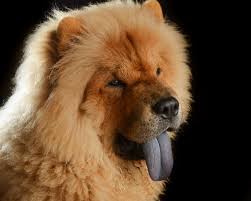Alternative Names: lang gou (wolf dog), xiong gou (bear dog), chow
Country of Origin: China
History: The chow chow originated in Asia and it is believed that its ancestors can be traced to the Han Dynasty. Some believe it is the result of a cross between the old mastiff of Tibet and the Samoyed. It was first used as a hunting dog for pheasant and partridge. Its name is derived from the pidgin English slang used by sailors to describe mixed cargo, chow-chow. Most theorize that the chow chow was brought to England as part of cargo and so was given that generic name. The breed became popular during the Victorian era in England and first appeared in the U.S. in 1890.

Physical Description: The chow chow is a medium size, sturdy dog. It has a square body and large, broad head with a short muzzle. It has prick ears with rounded tips and a scowling expression. The eyes are dark brown, almond shaped, and deeply set, giving the dog limited peripheral vision. Its tongue is bluish black and its nose is large and black, except in blue chows, when it is slate colored. The tail is set high and curled over the back. It is double coated and the outer coat can be smooth or rough. The smooth coat is longer and abundant. There is a ruff around the head and neck and the tail is plumed. It may be red, black, blue, cinnamon, or cream.
Height: 17 to 20 inches
Weight: 45 to 70 pounds
Temperament: The chow chow is a dignified and aloof dog. It is intelligent but can be detached and is especially reserved with strangers. It is loyal to its family. With socialization and training it can be quite good with children but often does poorly with other animals.
Activity Level: Low to moderate
Best Owner: The chow chow requires a firm, experienced owner; it can adapt to a city, suburban, or rural home
Special Needs: Grooming, socialization, training
Possible Health Concerns: Anesthesia sensitivity, cancer, entropion, heat sensitivity, hip dysplasia, knee problems




